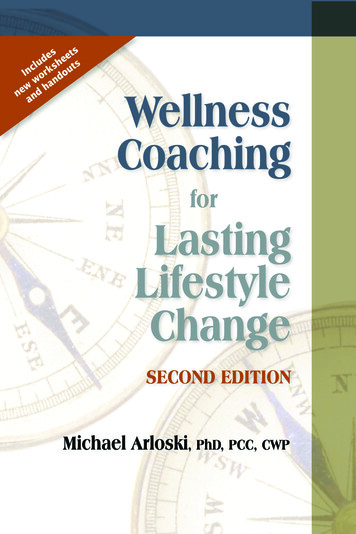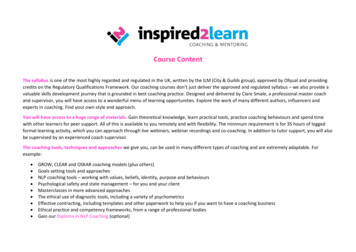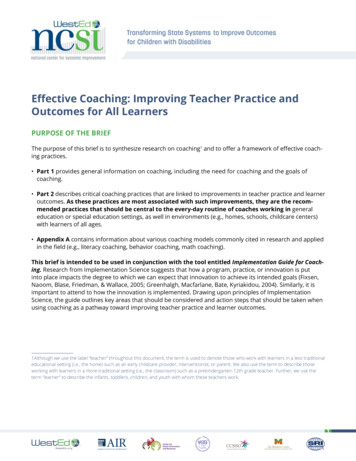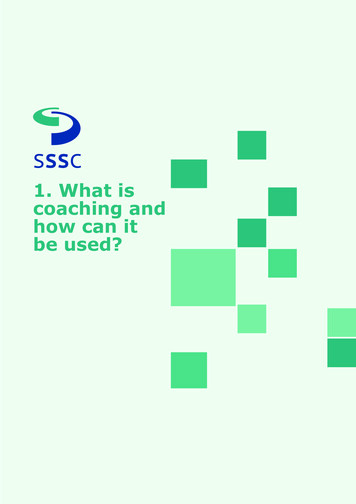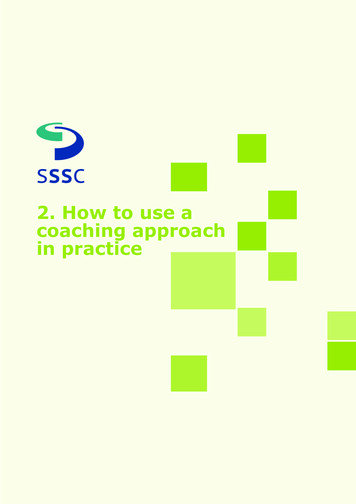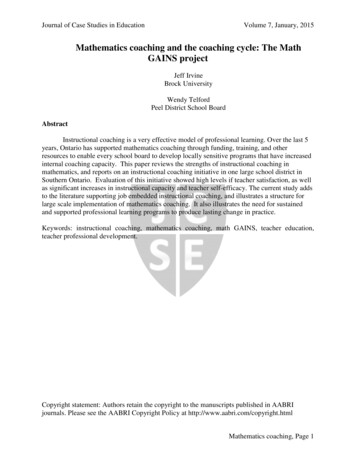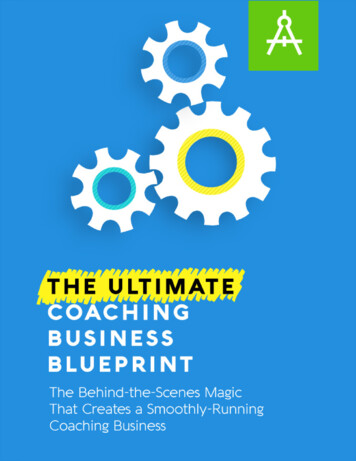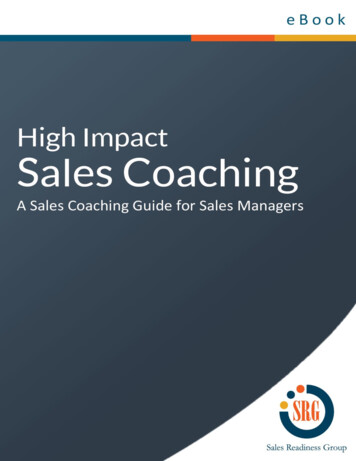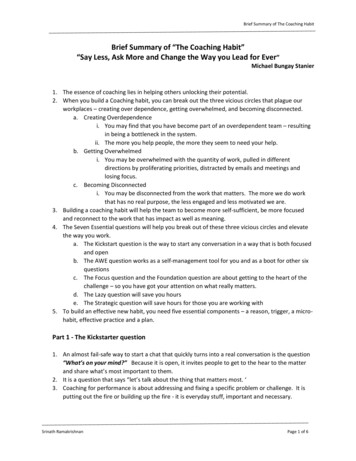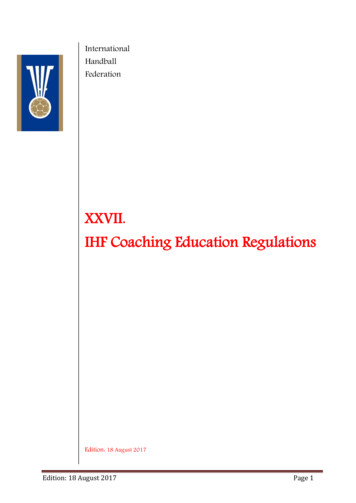
Transcription
InternationalHandballFederationXXVII.IHF Coaching Education RegulationsEdition: 18 August 2017Edition: 18 August 2017Page 1
Table of contents1.Basic principles2.Objectives of the IHF Coaching Education Structure3.IHF Education Centre4.The IHF Coaching Education Structure5.Scope and duration of coaching courses6.Access to the IHF Coaching Education Licences7.IHF Coaching Education provisions8.Qualifications of IHF lecturers9.General provisions governing the IHF Coaching Education levels’ tests10. Licensing provisions1. Validity2. Licence extension3. Inactive licences4. Withdrawal of licences11. Approval of national and continental education structures1. IHF approval2. Transitional arrangementsAnnexes1. Communication structure for global coaching education2. IHF Coaching Education StructureEdition: 18 August 2017Page 2
ARTICLE 1I.Basic principlesEducation is a key element in developing human resources in any organisation. For this reason, the IHFhas reviewed its Coaching Education Structure in order to successfully manage ongoing developmentsin information technology as well as new handball trends resulting from the application of the newRules of the Game.The IHF has developed its online education platform http://ihfeducation.ihf.info/ with the goal ofregularly providing updates to the various target groups (referees, coaches, players, school teachers,delegates, etc.). These updates will support the completion of the education cycle. The new IHF CoachingEducation Structure was approved by the IHF Council in July 2016 and details the four main levels aswell as the required hours and years needed to complete each level.ARTICLE 2II.Objectives of the IHF Coaching Education StructureThe new IHF Coaching Education Structure shall: Support the different educational structures, especially in non-European countries,Assist the development of educational structures, especially in non-European countries,Provide impulses for the structured development of youth and junior training (talent training),Increase the quality of coaches in all areas in order to improve the quality of our sport in thefuture, Develop the sport both at grassroots level (for example, children and school handball) and atthe top level, Provide new impetuses for the promotion of sports science research in handball.Additionally, there are several specific objectives: Promoting handball in schools and universities with qualified coaches and teachers,Training of multipliers involved in coaching education, especially in non-European countries,Supporting talented lecturers.Edition: 18 August 2017Page 3
ARTICLE 3III.IHF Education CentreThe new IHF Coaching Education Structure is part of a comprehensive IHF education campaign. Thenew IHF Education Centre plays a key role in this campaign. The IHF Education Centre is a modern andinnovative digital service platform for the global education of important target groups. It is designed toprovide consistent education for different levels (basic, advanced, top level), international knowledgetransfer, best practices from all countries, and modern learning tools such as online seminars.ARTICLE 4IV.The IHF Coaching Education StructureEdition: 18 August 2017Page 4
IHF D Licence Main teaching content: introduction to handball for beginners Coaches for children’s handball teams (training of beginners; coaches for mini handball) Teachers at primary or middle schools (Handball@School) Students at sports universities (special course for handball)IHF C Licence Main teaching content: basic training Youth coaches (players under 19)IHF B Licence Main teaching content: advanced training Junior coaches (players under 21) and senior coachesIHF A Licence Main teaching content: professional training (trends in modern handball, training methods fortop-level training, latest scientific research in handball) Top-level coaches (international level) Coaches from youth and junior national teamsARTICLE 5V.Scope and duration of coaching coursesThe following teaching units (1 teaching unit 45 minutes) are considered the minimum requirement.The number of teaching units can be increased according to each level of education.IHF D Licence 25 teaching units, minimum of 3 course daysIHF C Licence 60 teaching unitsIHF B Licence 90 teaching unitsIHF A Licence 150 teaching unitsEdition: 18 August 2017Page 5
ARTICLE 6VI.Access to the IHF Coaching Education LicencesIHF D LicenceRequirements for admission to coaching courses at the first licensing level are: At least 18 years, Approved by national federation.IHF C LicenceRequirements for admission to coaching courses at the second licensing level are: At least 21 years, Approved by national federation, Possession of a valid IHF D Licence, Evidence of having worked as a handball coach (teacher) after receiving an IHF D Licence for atleast 3 years (national level).IHF B LicenceRequirements for admission to coaching courses at the third licensing level are: At least 24 years, Approved by national federation, Possession of a valid IHF C Licence, Evidence of having worked as a head handball coach after receiving an IHF C Licence (totalexperience as a coach: minimum 6 years) for at least 3 years (national and continental level).Note: Former international top players (minimum of 100 international matches for senior national teamplus at least one world championship or Olympic Games participation) may start the educationprogramme at the B Licence level. In these cases, separate course programmes are required which shallbe adapted to the requirements of international top players.IHF A LicenceRequirements for admission to coaching courses at the fourth licensing level are: At least 27 years, Approved by national federation, Possession of a valid IHF B Licence, Evidence of having worked as a head handball coach (national and continental top level; headcoach of a youth, junior and/or senior national team) after receiving an IHF B Licence (totalexperience as a coach: minimum 9 years) for at least 3 years.Edition: 18 August 2017Page 6
ARTICLE 7VII.IHF Coaching Education provisionsResponsibility for coaching education The International Handball Federation is responsible for all IHF courses required for obtainingan IHF coaching licence. The IHF shall determine appropriate guidelines for education and appropriate educationalcontent (curriculum) for each level. Some courses may be conducted by other institutions/organisations after approval by the IHF.Note: The curriculum of the IHF is mandatory for the selection of the content in all cases.The following IHF courses are associated with the respective IHF licence levels:IHF D Licence IHF Handball@School course IHF special course for emerging national federations/4-year-plan nations IHF course for beginners Olympic Solidarity level 1 courseIHF C Licence IHF course for developing national federations IHF course for basic training Olympic Solidarity level 2 courseIHF B Licence IHF course for advanced training Continental courses under the umbrella of the IHF Olympic Solidarity level 3 courseIHF A Licence IHF Global Coaching Clinic (GCC)Edition: 18 August 2017Page 7
ARTICLE 8VIII.Qualifications of IHF lecturersThe technical and methodological qualifications of IHF lecturers are of primary importance for thesuccess of the IHF coaching courses. To ensure a high quality of education, the following guidelinesshould be followed:IHF D Licence IHF lecturers (B Licence or higher) with a special extension courseIHF C Licence IHF lecturers (B Licence or higher) with a special extension courseIHF B Licence IHF lecturers (A Licence or higher) with a special extension courseIHF A Licence IHF GCC group is responsibleSpecial extension courses:Special extension courses are held which will focus on teaching competence. These courses areorganised either by the IHF or a continental handball confederation on condition that the continentalhandball confederation courses are accredited by the IHF.ARTICLE 9IX.General provisions governing the IHF Coaching Education levels’ testsLearning results examinationsIn order to receive a licence, learning results examinations must be successfully completed. Objectivesof learning results examinations include: Achievement of learning objectives, Identification of gaps in knowledge, Feedback for learners, Demonstration of capability to assume desired profile, Feedback for lecturers/coaches.Edition: 18 August 2017Page 8
Types of successful learning results shall include: Active participation during the entire course, Evidence of practical demonstration ability, Group work (for example, evaluation of observation tasks), Planning, implementation and reflection of a practical lesson.Forms of the levels’ testsMinimum requirements for licence acquisition at all education levels: One practical training session (or part of a training session) must be completed, in which theteaching qualification can be observed, Passing a written test, For IHF A Licences, an additional written assignment is required.Admission to examinationsAdmission to examinations can only be granted to participants who have completed all educationalhours (maximum absences: 20%; must be compensated for with additional individual tasks). Missededucational hours may be rescheduled within the course period.Failed examinations In case an examination is failed, it may be repeated once.If the repeat test is failed, participants must repeat the entire course of the relevant licence level.Failed participants may repeat the same course after one (1) year at the earliest.ARTICLE 10X.Licensing provisions1. ValidityThe validity period begins on the date the licence is issued and ends on 31 December of the last year ofvalidity.The IHF Licences are valid for the following periods: After obtaining the IHF D Licence level: four (4) years After obtaining the IHF C Licence level: four (4) years After obtaining the IHF B Licence level: four (4) years After obtaining the IHF A Licence level: four (4) yearsEdition: 18 August 2017Page 9
2. Licence extensionLicences are extended for a period of four (4) years.In general, licence extension requires participation in an IHF extension course which is subject to: Proof of activity as a handball coach Proof of activity as a handball teacher in schools (for D license level)The following courses shall also be considered as extension courses:IHF D Licence Continental courses organised by continental confederation with accreditation from the IHFNational courses organised by national federation with accreditation from the IHF or approvedby continental confederation with accreditation from the IHF Minimum of 8 teaching unitsIHF C Licence Continental courses organised by continental confederation with accreditation from the IHFNational courses organised by national federation with accreditation from the IHF or approvedby continental confederation with accreditation from the IHF Minimum of 16 teaching unitsIHF B Licence Continental courses organised by continental confederation with accreditation from the IHFNational courses organised by national federation with accreditation from the IHF or approvedby continental confederation with accreditation from the IHF Minimum of 24 teaching unitsIHF A Licence IHF symposium or other courses approved by the IHFMinimum of 32 teaching units3. Inactive licencesA licence which has not been extended according to the specifications will expire.4. Withdrawal of licencesThe IHF reserves the right to withdraw an IHF Licence if the licence holder violates the IHF Statutesand/or any ethical principles.Edition: 18 August 2017Page 10
ARTICLE 11XI.Approval of national and continental education structures1. IHF approvalIHF Licences may only be issued to a national or continental federation if the federation’s entirecoaching education structure (i.e. licensing structure, curriculum of courses, and lecturers) has beenapproved by the IHF.2. Transitional arrangementsThe IHF shall create conditions to establish the new IHF Coaching Education Structure over a period oftwo (2) years from the date of the IHF Council decision. The IHF shall: Organise extension courses for IHF lecturers,Recruit and educate new lecturers/instructors on continents outside Europe,Review the educational content (curriculum) for the licence levels D to B,Develop the new IHF Education Centre as a content database for coaching education worldwide(for example, e-learning programmes), Develop the IHF Academy structure and databases (IHF, continental, national) at the IHF HeadOffice, Develop a coaching database (A level) at the IHF Head Office(B level shall be registered in databases of the continental confederations, C and D levels shallbe registered in databases of the national federations), Develop a system of extension courses for different levels,Provide the option to extend the licence validity through e-learning programmes,Determine specific conditions on the education of former international top players.Edition: 18 August 2017Page 11
Annexes1. Communication structure for global coaching educationEdition: 18 August 2017Page 12
2. IHF Coaching Education StructureEdition: 18 August 2017Page 13
The new IHF Coaching Education Structure was approved by the IHF Council in July 2016 and details the four main levels as well as the required hours and years needed to complete each level. ARTICLE 2 II. Objectives of the IHF Coaching Education Structure The new

